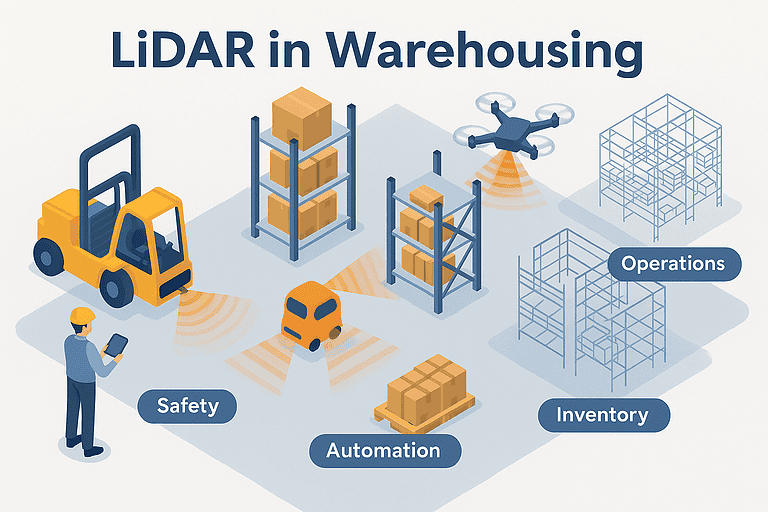Best 7 Inbound Software Solutions for Streamlined Operations
Drowning in a sea of delivery trucks? Streamline your operations with the top inbound software solutions to keep your warehouse humming!

The arrival of shipments can make or break your warehouse’s efficiency. But managing inbound deliveries, scheduling dock appointments, and ensuring a smooth flow of goods can be a logistical nightmare.
Fortunately, innovative software solutions are designed to transform your inbound operations from chaotic to controlled. This blog post dives into the top 10 software options on the market, exploring their functionalities and how they can empower your warehouse to conquer the inbound challenge.
From industry giants to rising stars, we’ll unveil the features that can optimize your dock scheduling, yard management, and overall receiving process.
Get ready to discover the perfect software solution to turn your inbound operations into a well-oiled machine!
The Best 7 Inbound Software Solutions
- Manhattan Associates. ($$$$$): A major player in WMS solutions, Manhattan Associates offers modules specifically designed for inbound yard management and scheduling. Learn more
- Blue Yonder (including JDA) ($$$$$): Blue Yonder’s cloud-based WMS offers features like appointment scheduling, dock management, and real-time visibility for optimizing inbound logistics. Learn more
- `WarehouseIQ ($$$$): This cloud-based WMS provides features like dock scheduling, appointment management, and yard management tools for efficient inbound operations. Learn more
- Tecsys ($$$$): Tecsys’ cloud-based WMS offers features for inbound scheduling, dock management, and integration with transportation management systems. Learn more
- Logistically ($$$): This cloud-based platform focuses on transportation management and includes features for optimizing inbound deliveries and scheduling dock appointments. Learn more
- Fishbowl ($): While primarily an MRP (Material Requirements Planning) system, Fishbowl integrates with warehouse management tools and offers features for scheduling inbound deliveries. Learn more
- TBD – still evaluating other options
It’s important to note:
- The best solution for your warehouse will depend on your specific needs, budget, and existing infrastructure.
- Many WMS providers offer different tiers or modules with varying functionalities. Some might require additional add-ons for specific features like advanced inbound scheduling.
- Consider scalability, ease of use, and integration capabilities when evaluating potential software solutions.
Additional Resources:
- Industry publications and analyst reports on WMS solutions can provide insights into leading providers and their strengths in specific areas, such as inbound scheduling.
- Logistics conferences or trade shows can offer opportunities to learn about different software solutions and connect with industry experts.

Manhattan Associates: A Powerhouse for Efficiency
Manhattan Associates stands as a titan in the Warehouse Management System (WMS) industry, offering a comprehensive suite of solutions that extend beyond core warehouse operations.
For inbound logistics, Manhattan provides specific modules designed to tackle the challenges of receiving shipments and scheduling dock appointments. Here’s a closer look at what Manhattan Associates brings to the table:
- Warehouse Management System (WMS) with Inbound Focus: Their WMS goes beyond basic inventory management by offering functionalities specifically designed for inbound operations. This includes features like:
- Advanced Appointment Scheduling: Schedule inbound deliveries based on dock availability, carrier lead times, and warehouse capacity, ensuring a smooth flow of goods.
- Yard Management: Gain real-time visibility into yard operations, optimize truck staging areas, and manage trailer movements efficiently.
- Automated Workflows: Automate tasks like generating dock door assignments, sending shipment notifications, and receiving paperwork, reducing manual processes and saving time.
- Real-Time Visibility: Track the progress of incoming shipments in real-time, allowing for better planning and proactive measures to address potential delays.
- Integration Capabilities: Manhattan’s WMS seamlessly integrates with other parts of its supply chain solutions, including Transportation Management Systems (TMS), for a holistic view of your logistics network. This allows for better coordination between inbound deliveries and overall transportation planning.
- Scalability and Customization: Their solutions cater to warehouses of all sizes, offering scalable options that can adapt to your needs and grow alongside your business.
However, there are some things to consider:
- Cost: As a major industry player, Manhattan’s solutions might have a higher price tag than some competitors.
- Complexity: The comprehensive nature of their WMS can have a steeper learning curve than simpler solutions.
Overall, Manhattan Associates is a powerful solution for warehouses seeking a robust and scalable WMS with a strong focus on optimizing inbound operations. Manhattan Associates is worth considering if you have a complex warehouse environment with high inbound volume and require a comprehensive solution.

Blue Yonder: A Strong Inbound Contender
Blue Yonder, formed through the merger of Blue Yonder and JDA Software in 2018, is another major player in the WMS arena, offering a comprehensive suite of solutions for warehouse management, including functionalities specifically geared towards inbound logistics.
Here’s how Blue Yonder stacks up for optimizing your inbound operations:
- Appointment Scheduling & Dock Management: Schedule deliveries based on real-time data, optimize dock utilization, and automate dock door assignments.
- Cloud-Based WMS with Inbound Strengths: Blue Yonder’s cloud-based WMS boasts features designed to streamline inbound processes.
- Real-Time Visibility: Track incoming shipments in real-time, allowing for proactive adjustments to accommodate delays or changes in arrival times.
- Integration Powerhouse: Blue Yonder excels at integrating with other parts of your supply chain ecosystem, including Transportation Management Systems (TMS), to provide a unified view of your logistics network. This facilitates smooth coordination between inbound deliveries and overall transportation planning.
- Scalability & Customization: Blue Yonder caters to warehouses of various sizes with scalable solutions that adapt to your specific needs and grow alongside your business. Their WMS platform offers various tiers, allowing you to choose a package that best fits your budget and operational complexity.
Similarities to Manhattan Associates:
Market Presence & Pricing: Like Manhattan, Blue Yonder is a major industry player with comprehensive solutions. Their pricing likely falls in the same high-end range (possibly slightly lower than Manhattan).
Considerations When Choosing Blue Yonder:
- Complexity: While offering a user-friendly interface, Blue Yonder’s WMS can have a learning curve due to its comprehensive nature.
- Implementation Costs: Factor in potential implementation costs associated with setting up the system, migrating data, and employee training.
Blue Yonder (including JDA) is a strong contender for warehouses seeking a powerful cloud-based WMS with advanced features for optimizing inbound operations. Blue Yonder is worth exploring if you require a scalable solution with robust functionalities for managing inbound deliveries, scheduling docks, and gaining real-time visibility.

WarehouseIQ: A User-Friendly Option
WarehouseIQ is a compelling solution for mid-sized warehouses seeking to streamline their inbound operations with a user-friendly and cost-effective approach.
Here’s a more detailed look at WarehouseIQ’s strengths and considerations to help you decide if it’s the right fit for your needs:
Strengths
- Focus on User-Friendliness: WarehouseIQ prioritizes a clean and intuitive interface, making it easy for warehouse personnel to learn and navigate the system. This is particularly beneficial for warehouses that might not have dedicated IT staff or require a quick implementation with minimal disruption to daily operations.
- Cloud-Based Delivery: WarehouseIQ’s cloud-based nature eliminates the need for extensive hardware setup or IT maintenance. This translates to faster deployment, lower upfront costs, and automatic software updates, ensuring you always have access to the latest features.
- Targeted Inbound Functionalities: While not as comprehensive as some enterprise-level solutions, WarehouseIQ offers key features specifically designed to optimize inbound logistics.
- Dock Scheduling & Appointment Management: Schedule deliveries, manage dock availability, and communicate arrival times with carriers, promoting a smooth flow of incoming goods.
- Yard Management Tools: Track trailers in the yard, optimize staging areas to minimize congestion, and streamline the receiving process upon arrival.
- Real-Time Visibility: Gain instant insights into the status of incoming shipments, allowing for better planning, resource allocation, and proactive adjustments in case of delays.
- Reporting & Analytics: Generate reports that provide valuable insights into your inbound operations. These reports help you identify areas for improvement and measure the impact of implemented changes.
Scalability & Affordability
WarehouseIQ offers a scalable cloud-based solution with tiered pricing models. You can choose a package that aligns with your current warehouse size and operational complexity.
As your business grows, you can easily upgrade to a higher tier to accommodate your expanding needs. Their pricing likely falls in the high-end range for mid-sized solutions but is generally considered cost-effective compared to some competitors.
Considerations
- Feature Set: While WarehouseIQ offers strong inbound functionalities, it might not have the same comprehensive features as solutions for larger enterprises. For warehouses with complex operations or very specific needs, WarehouseIQ might lack customization or advanced functionalities.
- Limited Customization: WarehouseIQ offers a streamlined platform with fewer extensive customization options than some competitors. If you have highly unique workflows or require a system that can be heavily tailored to your specific processes, WarehouseIQ might not be the most suitable choice.
- Integration Capabilities: While WarehouseIQ integrates with some basic transportation management systems (TMS), its integration capabilities might be more limited than some competitors. If you have a complex supply chain network with extensive integrations between various systems, WarehouseIQ might require additional workarounds to achieve the desired level of connectivity.
Who is WarehouseIQ a good fit for?
WarehouseIQ is a strong choice for mid-sized warehouses that prioritize the following:
- User-friendliness and ease of implementation
- Cost-effective solution with a focus on core inbound functionalities
- Cloud-based deployment for quick setup and automatic updates
- Scalability to accommodate future growth
If you’re a mid-sized warehouse looking for a user-friendly and cost-effective solution to streamline your inbound operations, WarehouseIQ is worth considering. However, if you require a highly customized system with extensive functionalities or complex integration needs, you might need to explore solutions from other vendors.

Tecsys: A Tailored Approach to Inbound Optimization
Tecsys stands out as a well-established player in the WMS market, offering a versatile solution that caters to the specific needs of each warehouse, with a particular focus on inbound efficiency.
Here’s a deeper dive into Tecsys’ strengths and considerations to help you determine if it aligns with your warehouse’s requirements:
Strengths
- Flexibility & Customization: Tecsys prides itself on offering a highly customizable WMS tailored to your unique workflows and business processes. This allows you to configure the system to match your specific inbound operations, ensuring optimal efficiency based on your needs.
- Robust Inbound Management Features: Tecsys offers a comprehensive suite of functionalities to streamline inbound logistics.
- Appointment Scheduling & Dock Management: Schedule deliveries, manage dock utilization effectively, and automate dock door assignments to optimize receiving processes.
- Warehouse Automation Integration: Tecsys integrates with various warehouse automation technologies, such as automated storage and retrieval systems (AS/RS) and conveyor systems. This can improve inbound processes like receiving, away, and order fulfillment.
- Real-Time Visibility & Reporting: Gain real-time insights into the status of incoming shipments, track inventory levels, and generate reports to identify bottlenecks and inefficiencies in your inbound operations. These reports can be used to make data-driven decisions for continuous improvement.
- Warehouse Automation Integration: Tecsys integrates with various warehouse automation technologies, such as automated storage and retrieval systems (AS/RS) and conveyor systems. This can improve inbound processes like receiving, away, and order fulfillment.
- Scalability & Growth Potential: Tecsys offers a scalable solution that can adapt to the needs of growing warehouses. As your business expands, you can easily add new features or modules to accommodate your evolving requirements.
- Industry Expertise & Proven Track Record: Tecsys boasts a long history in the WMS market and a proven track record of success in implementing solutions across various industries. Their experience can be valuable in understanding your needs and recommending the best configuration for your warehouse.
Considerations:
- Implementation Costs: The customization options and potential integration with automation technologies might lead to higher implementation costs than some competitors. The level of customization you choose will directly impact the overall cost.
- Complexity: Depending on the level of customization required, Tecsys’ WMS might have a steeper learning curve than simpler solutions. Extensive customization might require additional training for your warehouse personnel.
- Integration Complexity: Integrating Tecsys with your existing systems or warehouse automation technologies might require additional development work, potentially increasing project complexity and cost.
Who is Tecsys a good fit for?
Tecsys is a powerful solution for mid-sized to large warehouses that prioritize the following:
- Highly customized WMS tailored to their specific workflows
- Integration with existing systems or warehouse automation technologies
- Scalability to accommodate future growth and changing needs
- Industry expertise and proven track record
If you’re a mid-sized or large warehouse seeking a customizable WMS with strong inbound management features and the potential for automation integration, Tecsys is a strong contender. However, be prepared for potentially higher costs associated with customization and implementation compared to some competitors.
WarehouseIQ vs. Tecsys
Here’s a quick comparison between WarehouseIQ and Tecsys to help you decide:
| Feature | WarehouseIQ | Tecsys |
|---|---|---|
| User-Friendliness | High | Moderate (depending on customization) |
| Implementation Time | Fast | Moderate to complex (depending on customization) |
| Scalability | Scalable for mid-sized warehouses | Scalable for mid-sized to large warehouses |
| Customization | Limited | Highly customizable |
| Cost | Cost-effective for mid-sized warehouses | Potentially higher cost due to customization |
| Integration | Basic TMS integrations | Broader integration capabilities |
| Inbound Focus | Strong core inbound functionalities | Strong inbound functionalities with automation potential |
Ultimately, the best choice between WarehouseIQ and Tecsys depends on your needs, budget, and warehouse complexity. Carefully evaluate your priorities and weigh the strengths and considerations of each solution before making a decision.
WarehouseIQ & Tecsys: Streamlining Mid-sized Operations
While Manhattan Associates and Blue Yonder cater to larger enterprises, WarehouseIQ and Tecsys offer compelling solutions for mid-sized warehouses seeking to optimize their inbound operations. Here’s a closer look at what each brings to the table:
Logistically: A Cloud-Based Contender for Streamlined Inbound Operations
Logistically emerges as a company focusing on cloud-based Transportation Management Systems (TMS) with functionalities that extend to optimizing inbound logistics for warehouses. Here’s what Logistically brings to the table:
- Appointment Scheduling & Dock Management: Schedule deliveries based on carrier lead times and warehouse capacity, optimize dock utilization, and manage appointments effectively.
- Cloud-Based TMS with Inbound Focus: Their cloud-based TMS goes beyond freight management, offering features designed to streamline inbound deliveries.
- Integration Potential: Logistically, TMS integrates with various warehouse management systems (WMS) and other logistics software, facilitating a more connected supply chain network. This improves coordination between inbound deliveries, transportation management, and overall warehouse operations.
- Focus on User-Friendliness: Logistically emphasizes a user-friendly interface, making it easier for warehouse personnel to adopt the system and manage inbound operations efficiently.
Possible Considerations
- Comprehensiveness: While Logistically offers strong functionalities for inbound scheduling and management, it might not be as comprehensive as dedicated WMS solutions regarding overall warehouse management features.
- Focus on Transportation Management: Their core focus lies in transportation management, and inbound functionalities might be a subset of their broader TMS offering.
Who is Logistically a good fit for?
Logistically, TMS can be a good choice for warehouses that:
- Prioritize a cloud-based solution for managing inbound deliveries and transportation.
- Seek a user-friendly system for streamlined scheduling and dock management.
- We need to have a separate WMS for core warehouse operations and improve inbound logistics coordination with transportation management.
Logistically vs. WarehouseIQ
Here’s a quick comparison between Logistically and WarehouseIQ to help you decide:
| Feature | Logistically | WarehouseIQ |
|---|---|---|
| Core Focus | Transportation Management System (TMS) with | Warehouse Management System (WMS) with a |
| inbound functionalities | focus on inbound functionalities | |
| Deployment | Cloud-based | Cloud-based |
| User-Friendliness | High | High |
| Implementation Time | Potentially faster due to the focus on TMS | Potentially faster due to streamlined features |
| Inbound Scheduling | Strong | Strong |
| Dock Management | Strong | Strong |
| Integration | Integrates with various WMS and Logistics | Limited integration capabilities |
| WMS Features | Limited | More comprehensive WMS functionalities |
| Cost | Pricing might vary depending on the features | Cost-effective for mid-sized warehouses |
Ultimately, the best choice between Logistically and WarehouseIQ depends on your needs and priorities. If you prioritize a TMS-centric approach with strong inbound functionalities and user-friendliness, Logistically is a strong contender. However, if you need a more comprehensive WMS solution with features beyond inbound management, WarehouseIQ might be a better fit.
Fishbowl
Fishbowl stands out as a software solution primarily focused on Material Requirements Planning (MRP), but it also integrates with warehouse management tools and offers functionalities that can support inbound operations. Here’s a breakdown of what Fishbowl brings to the table for inbound scheduling:
Strengths
- MRP Integration: Fishbowl excels at MRP, which helps you plan and manage purchasing materials needed for production. This indirectly impacts inbound scheduling by ensuring you have the right materials on hand before production begins, potentially reducing delays in receiving inbound shipments.
- Warehouse Management Integrations: Fishbowl integrates with various warehouse management systems (WMS). These integrations allow you to leverage functionalities offered by dedicated WMS solutions, potentially including features for inbound scheduling, dock management, and real-time tracking of incoming shipments.
- Inventory Management: Fishbowl offers strong inventory management features, which can help plan inbound deliveries. By viewing your inventory levels clearly, you can determine when and what materials need replenishment, impacting your inbound scheduling decisions.
Considerations
- Not a Dedicated WMS: Fishbowl is not a full-fledged WMS solution. While it can integrate with WMS systems and offer some functionalities relevant to inbound scheduling, it might lack the comprehensive features of dedicated WMS solutions designed specifically for warehouse management.
- Focus on Manufacturing: Fishbowl is primarily targeted towards manufacturing businesses. If your warehouse focuses on distribution or fulfillment rather than production, Fishbowl’s functionalities might not be a perfect fit.
- Integration Complexity: Fishbowl’s effectiveness for inbound scheduling depends heavily on the specific WMS you integrate with and its functionalities. This integration might require Additional setup or configuration to leverage inbound scheduling features.
Who is Fishbowl a good fit for?
Fishbowl can be a good choice for:
- Manufacturing Businesses with MRP Needs: Fishbowl can be valuable if your warehouse is part of a manufacturing operation and requires strong MRP functionalities. The potential WMS integration can provide additional support for inbound scheduling.
- Smaller Warehouses Seeking a Cost-Effective Solution: Fishbowl might be a more affordable option for smaller warehouses with limited budgets than some comprehensive WMS solutions. However, ensure the integrated WMS offers the specific inbound scheduling features you need.
Fishbowl vs. WarehouseIQ
Here’s a comparison between Fishbowl and WarehouseIQ to help you decide:
| Feature | Fishbowl | WarehouseIQ |
|---|---|---|
| Core Focus | Material Requirements Planning (MRP) | Warehouse Management System (WMS) with a |
| with some warehouse management integrations | focus on inbound functionalities | |
| Deployment | Cloud-based | Cloud-based |
| User-Friendliness | Moderate (depends on WMS integration) | High |
| Implementation Time | Potentially faster due to MRP focus | Potentially faster due to streamlined features |
| Inbound Scheduling | Limited (dependent on WMS integration) | Strong |
| Dock Management | Limited (dependent on WMS integration) | Strong |
| Integration | Integrates with various WMS | Limited integration capabilities |
| WMS Features | Limited | More comprehensive WMS functionalities |
| Cost | Potentially more affordable | Cost-effective for mid-sized warehouses |
Ultimately, the best choice between Fishbowl and a dedicated WMS like WarehouseIQ depends on your needs. If MRP is a critical component and your inbound scheduling needs are not overly complex, Fishbowl with a WMS integration might suffice.
However, if you require a comprehensive WMS solution with robust inbound scheduling features as a core functionality, WarehouseIQ or another dedicated WMS provider would be a better fit.






